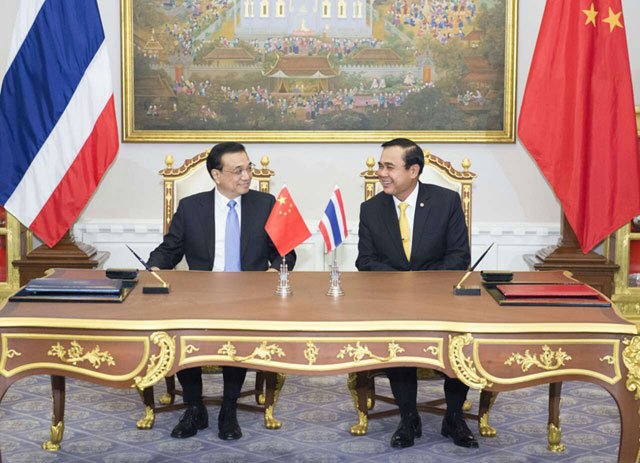
The ground was broken on Dec 19 for Chinese and Thai companies to build the first standard-gauge railway in Thailand, applying China’s technology, standard and equipment, the China Railway Corporation (CRC) said.
A launching ceremony was held on the same day at Chiang Rak Noi Station in central Thailand’s Ayutthaya province.
The 845-km railway will allow trains to operate at top speeds of 180-250 km per hour. The whole project will be divided into four sections, namely, Bangkok-Kaeng Khoi, Kaeng Khoi-Map Ta Phut, Kaeng Khoi-Nakhon Ratchasima and Nakhon Ratchasima-Nong Khai.
Premier Li Keqiang and his Thai counterpart, Prime Minister Prayuth Chan-ocha, sent each other congratulatory messages on the commencement of the cooperation project.
In his message, Premier Li expressed the hope that fulfillment of the project will lay a foundation for an early opening to the traffic of a “great artery” connecting China, Laos and Thailand, so as to promote common development in the region and bring benefit to the people.
Prayuth said the project will not only lay an important cornerstone for the two countries to launch closer cooperation in the future, but will also benefit the two peoples, enhance the two countries’ competitiveness, and promote regional economic development and prosperity.
In the past, Premier Li said the China-built railway in Bangkok will stimulate infrastructure construction in Thailand and improve regional interconnectivity. Moreover, it will help boost export of Thai products and will open a new channel for Chinese tourists to reach Thailand.
The railway runs across Thailand, connecting Laos’ Vientiane and reaching China’s Kunming in the north while extending to Malaysia and Singapore in the south. Along with the construction of the railway, Thailand’s status as ASEAN’s transportation hub will be reinforced. Meanwhile, cooperation between China and ASEAN will be boosted.
Railway cooperation between China and Thailand can benefit the two neighbors. Travel expense from Kunming to Bangkok by train will be reduced to 700 yuan ($108), only one third of that by air.
Furthermore, the railway can help transfer China’s excessive industrial capacity and test railway equipment in international market, which will help upgrade domestic industries and improve the competiveness of “Made-in-China”.
Background: How Premier Li promoted China-Thailand railway cooperation
-In October 2013, during Premier Li’s visit to Thailand, he expressed a wish to participate in the construction of high-speed rail connecting Bangkok and Nong Khai. The two countries announced a prospective plan, which confirmed strengthening cooperation in railway construction.
-In October 2014, Premier Li exchanged views on railway cooperation with his Thai counterpart Prime Minister Prayuth Chan-ocha on the sidelines of the 10th Asia-Europe Meeting in Milan, Italy. The two leaders agreed to push forward signed contracts.
-One month later, Premier Li met Prime Minister Prayuth in Beijing again. Prayuth said after the meeting that his government will advance cooperation with China in railway, agriculture, economy and trade. In early December 2014, Thailand’s national legislative body approved a draft memorandum of understanding, marking substantial progress in China-Thailand railway cooperation.
-On December 19, 2014, Premier Li and Prime Minister Prayuth witnessed the signing of two MoUs between the two governments on railway cooperation and agricultural trade in Bangkok.
-On December 22, 2014, Premier Li held talks with Prime Minister Prayuth once again in Beijing. The two sides agreed to further consolidate joint development and friendship through the railway projects.
-In September 2015, Premier Li met with Thai Deputy Prime Minister and Defense Minister Prawit Wongsuwan in Beijing. Premier urged an early start of the railway project once the preparation finished in order to bring forward its benefits as soon as possible.
-In October 2015, Premier Li hailed the China-Thailand railway project as the “highlight and focus” of bilateral cooperation during a meeting with Thai Foreign Minister Don Pramudwinai.
